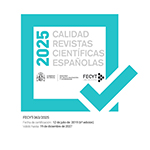Masculinity in dispute: the reason why men can't defend “A rapist in your path”
Abstract
Introduction This study analyses the responses on the web to the publication of the newspaper Metro Ecuador about the interruption of a performance of "A rapist on your way" in a square in Santiago de Compostela (on December 11, 2019). Objective. The study focuses on the interactions that are established with a user after he makes a comment in defense of the feminist manifestation. Methodology. One hundred and twenty-four interventions are analysed using the thematic analysis methodology in six phases. With this methodology, four categories of analysis of the interventions were generated: refusal addressed to the sender’s message, refusal addressed to women and feminism, support to the initial message and rejection of sexist comments. Results. The results show that most of the interventions, carried out by men, reject the “alliance” of this man with women; rejection is carried out through direct or indirect aggression, by questioning his gender, sexuality, motivations of the comment, or attacking and discrediting him, among other strategies. The interventions also lead to attacks against feminism as a political movement and against feminist women; in addition, women in general will be attacked, mocking the traditional roles attributed to gender and justifying macho behaviour, among other things. There is only a minimum of supportive arguments, which revolve mainly around the empathy that generates the possibility that this happens to "your mother, daughter, sister" or sexist defence arguments (protection for being the “weak gender”). Conclusions and discussion. This analysis contributes to reflecting on the impossibility that, in a patriarchal culture, men could abandon the position of competence against women and be solidary with feminist struggles, since in doing so they receive a "call to order" by members of their gender.
Downloads
Article download
License
In order to support the global exchange of knowledge, the journal Investigaciones Feministas is allowing unrestricted access to its content as from its publication in this electronic edition, and as such it is an open-access journal. The originals published in this journal are the property of the Complutense University of Madrid and any reproduction thereof in full or in part must cite the source. All content is distributed under a Creative Commons Attribution 4.0 use and distribution licence (CC BY 4.0). This circumstance must be expressly stated in these terms where necessary. You can view the summary and the complete legal text of the licence.











